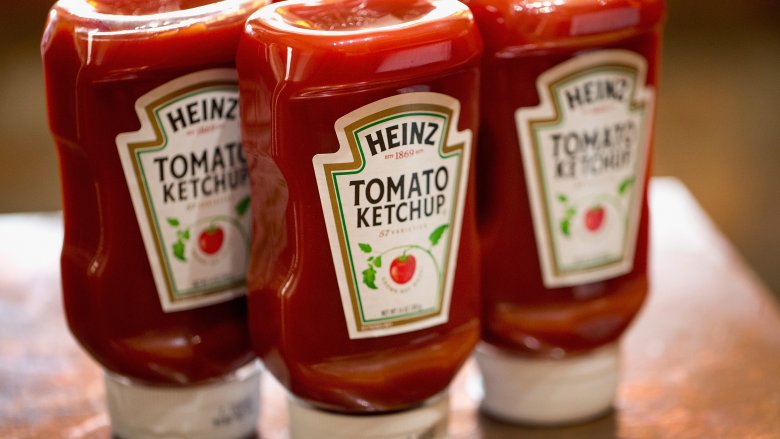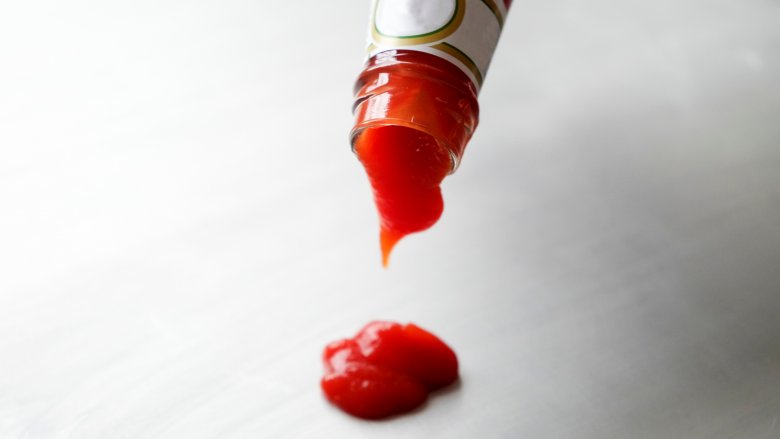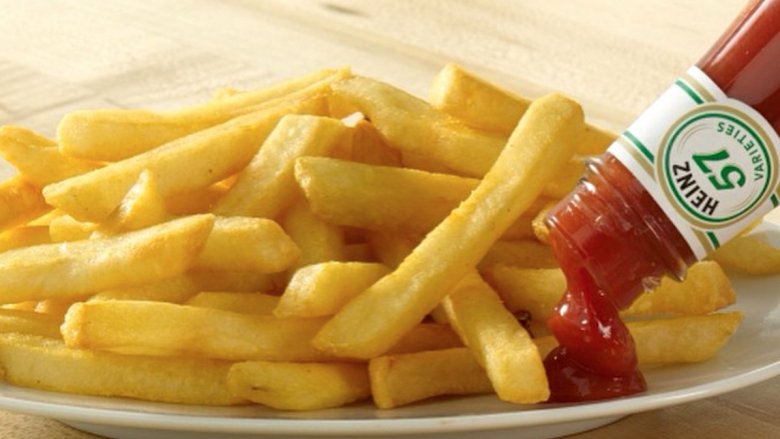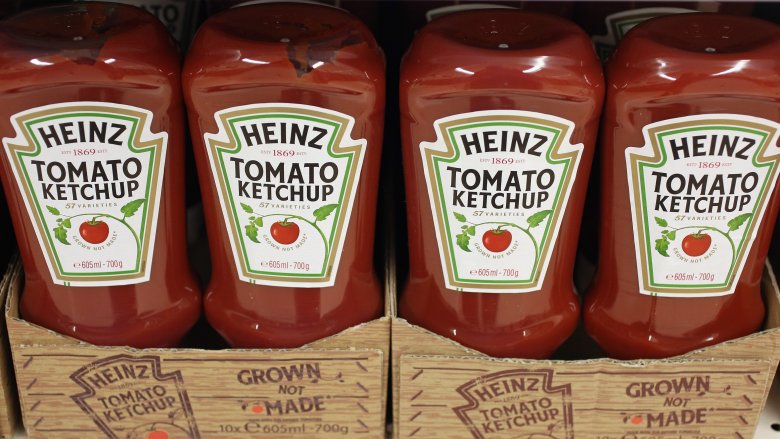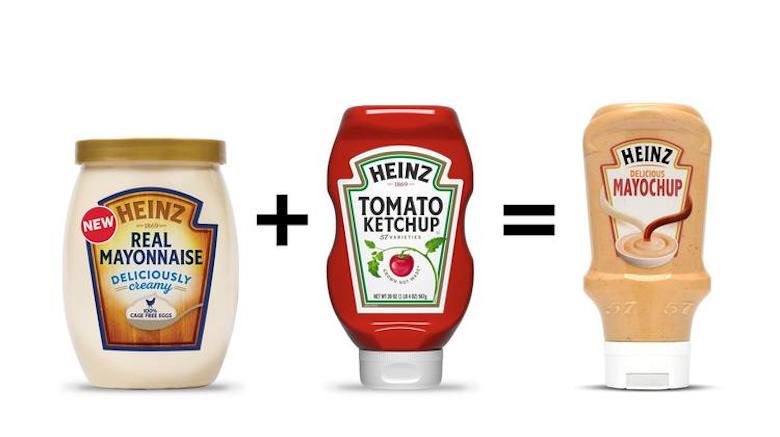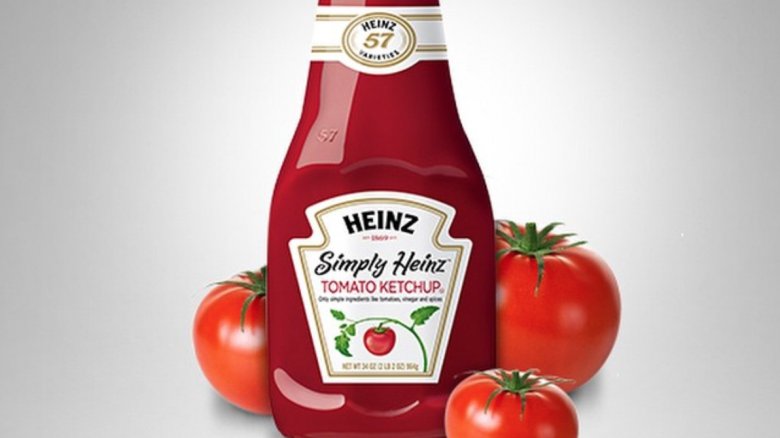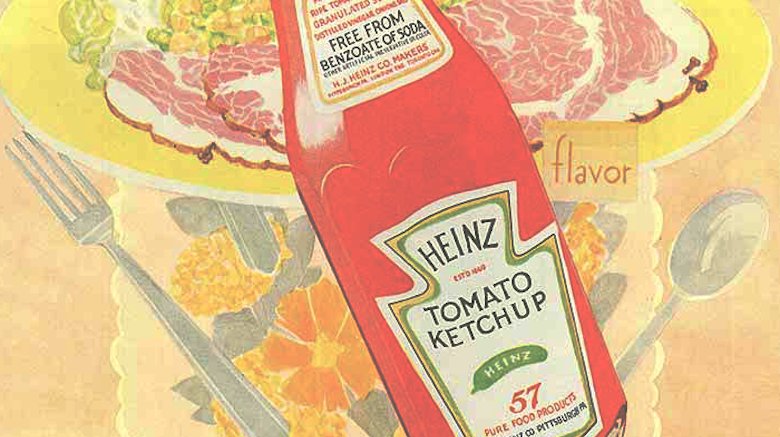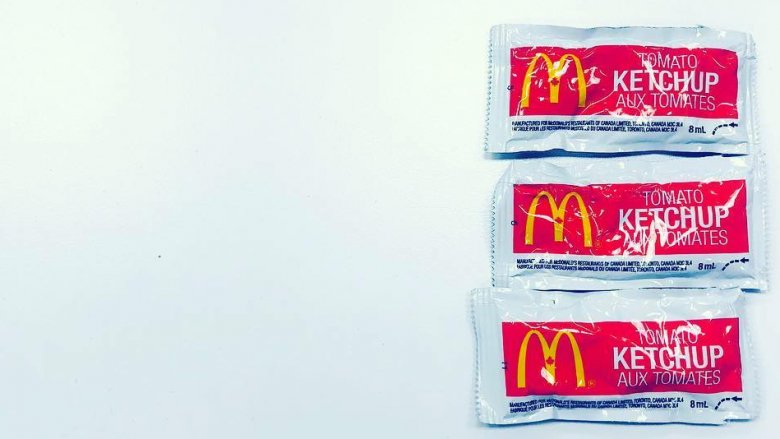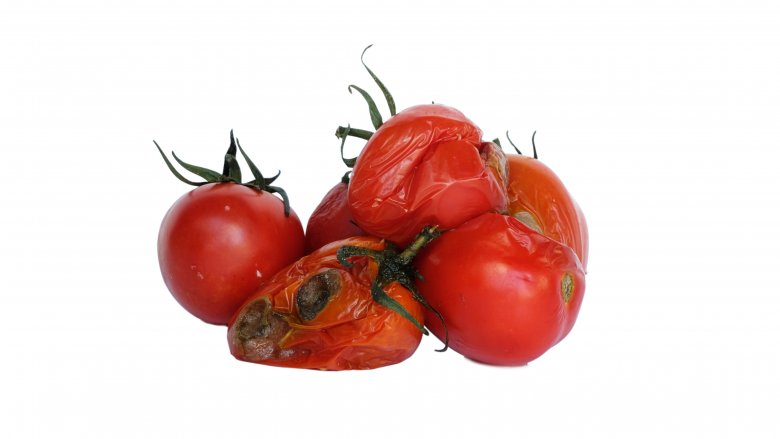The Untold Truth Of Heinz Ketchup
Although bottled horseradish was actually the first product H.J. Heinz produced in 1869, it's not the condiment we all know and love them for — that would be their ketchup. Since hitting the market in 1876 with its iconic octagonal glass bottle, Heinz Ketchup has become the ubiquitous condiment. Those packets you get at the fast food joint? Probably Heinz. The bottle in your fridge? Probably Heinz. According to NPR, of the 97 percent of Americans who have a bottle of ketchup in their kitchens, Heinz accounts for about half. The reason for their dominating market share is simple: It's "the perfect recipe," the company says.
And when you've been making "perfect" ketchup for over 140 years, there's bound be some juicy secrets and strange facts out there, from a rotten tomato scandal to exactly how fast it comes out of the bottle to how you've probably been pouring it wrong your whole life. Here's everything you don't know about the condiment H.J. Heinz invented all those years ago.
"57" doesn't mean what you think it does
You might logically assume, based on the "57 Varieties" slogan that adorns Heinz Ketchup bottles, that there are, or at least were at some point, 57 varieties of Heinz Ketchup. But you would be wrong. It's actually a totally arbitrary number.
The number was chosen by Henry Heinz in 1896, 20 years after their ketchup was first sold. At this point, the company already had more than 60 varieties of product including pickles, olive oil, spaghetti, peanut butter, and more. But one day, as Heinz rode a train through New York, he noticed a sign that advertised "21 varieties of shoes," which according to the company's website, he found to be clever. He decided on 57 varieties for his company, a number he felt was lucky but which had no other meaning, and immediately started plastering all products and advertisements with the slogan. Today, the company sells more than 5,700 varieties, but the catchphrase remains.
Another place you might see a puzzling number (this one varies) is on the upper right corner of the single serve packets. Turns out this number actually does have a meaning behind it, though it's strictly operational. According to Heinz, it's the line the packets were filled on in the factory.
You're not pouring Heinz Ketchup right
That "57" on the bottle may not have any real meaning, but it does serve a purpose for those short on patience.
If it seems like your Heinz Ketchup takes an excruciatingly long time to go from bottle to burger, it's because the condiment exits its glass container at 0.028 miles per hour, and anything faster than that will be rejected for sale. Nobody wants watery ketchup, obviously, but there are a couple tricks to get your fix a little faster.
According to Live Science, there is a proper way to pour ketchup both faster and splatter-free. Because ketchup is a "soft solid," you've got to give it a little TLC to coax it out of the bottle. First, shake well to distribute the solid particles and ensure an even flow. Then, with cap still on, turn the bottle upside down. Finally, tilt to a 45 degree angle, uncap, and give the bottom a few firm taps.
But if you ask the good people at Heinz, all you need to do is utilize that embossed "57" on the bottle neck. A firm tap at that point on the tilted bottle is all you need to get the ketchup out with a little extra speed. Ketchup, hacked.
They sell a mind-blowing amount of Heinz Ketchup
Given that Heinz accounts for around 50 percent of all the ketchup in American kitchens, it's not too surprising to hear that they sell a lot of product. But the actual numbers will blow your mind — we're talking millions and billions here.
Each year, 650 million bottles of Heinz Ketchup are sold in 140 countries worldwide — that's 1,000 bottles every minute, and results in more than $1.5 billion dollars annually. But let's not forget the single serve packets. The company sells 11 billion packets per year, which, according to the company website, works out to two packets for every person on earth. Of course, it requires a lot of tomatoes to make all this ketchup, and Heinz uses over 2 million tons each year, making them the largest user of tomatoes in the world. That sounds like a lot of fruit, right? Picture this: If you put all the tomato-processing trucks end to end, the line would stretch almost 900 miles.
Mayochup stirred up a huge debate
Heinz caused quite a stir in April 2018 with one little tweet: "Want #mayochup in stores? 500,000 votes for "yes" and we'll release it to you saucy Americans."
The condiment, a simple blend of ketchup and mayonnaise that the company has already introduced in some Middle Eastern countries, sparked outrage for some Twitter users who called it appropriation, due to the fact that Latinos have been making this very sauce for years. "It is #MayoKetchup and we invented it ages ago in Puerto Rico. Too late Heinz," one Puerto Rican user tweeted.
Meanwhile, in the states, Utahns laid claim to the hybrid condiment, with one user tweeting, "It's not 'Mayochup' or 'Mayoketchup'... it's Fry Sauce, and I'm 160% sure it was invented in Utah... because it was. Get it right."
In any case, the Twitter poll ended with close to a million votes, and 55 percent of the people said "yes" to the Mayochup. Ask and you shall receive — the company officially released the product to the U.S. market in late 2018.
You can thank Ed Sheeran for this Heinz treat
Ed Sheeran has a lot of tattoos, but if you look closely you'll see a familiar ketchup label on his left bicep. Yes, the singer loves Heinz that much. So much, apparently, that he even brings it with him on tour. The Sun alleges that a source revealed Sheeran's ketchup habits, saying, "Ed's made no secret of his Heinz Ketchup obsession and has run out of patience with going to places that don't serve it while he's touring. He's made it a duty of key members of his entourage to carry a bottle wherever he goes so he can have it with everything from his morning sausage butty to upmarket dinners."
Seeing an opportunity here, a gelato shop in Ireland decided to create a ketchup-infused treat in honor of Sheeran's upcoming concert, and even offered a freebie to concert-goers. "We @gelati_icecream decided to welcome Ed Sheeran back to Ireland by creating his favourite flavour: Tomato ketchup!! Drop in for a free Ketchup cone if attending the concert," they said on Instagram. "Everyone knows there's no ketchup like Heinz..."
The gelato is made with real ketchup and even topped with a drizzle of it for good measure. Yum?
The exploding Heinz Ketchup bottles
Knowing how popular and profitable Heinz Ketchup is, why wouldn't criminals try to pass Simply Heinz, the "higher end" ketchup made with real sugar instead of high-fructose corn syrup, for the less expensive stuff? Well, they tried, but it ended in a condiment explosion instead of suitcases full of cash.
In 2012, thousands of bottles of ketchup labelled Simply Heinz began exploding in a privately owned New Jersey warehouse in what appeared to be a counterfeiting scheme. The idea was to fill so-called Simply Heinz bottles with regular ol' Heinz Ketchup, but sell it at the inflated Simply Heinz price. But because of the heat in the warehouse, fermentation caused a pressure build-up, and... boom!
But does this mean the bottles we have at home might blow at any minute? Unlikely. The explosion is likely due to bacteria. Rutgers University food chemist Thomas Hartman told Live Science, "When you get expansion and containers blowing up like that, a lot of the time it's from gas buildup within the container, and that's usually a red flag for microbial growth. By transferring the ketchup from one container to another, they could have breached the [containers'] sterility."
And don't worry about unknowingly buying counterfeit Heinz. "These incidences are rare for Heinz," the company said. "As the world's leading manufacturer of ketchup, Heinz has stringent manufacturing and packaging practices in place to ensure the safety of consumers."
Heinz Ketchup is the perfect ketchup
Heinz themselves calls it "the perfect recipe." Others have referred to it as "objectively perfect." But exactly how did H.J. Heinz invent the perfect ketchup all those years ago?
According to Malcolm Gladwell of The New Yorker, what Heinz created is exactly the right balance of the five fundamental tastes: salty, sweet, bitter, sour, and umami. Gladwell explains, "When Heinz moved to ripe tomatoes and increased the percentage of tomato solids, he made ketchup, first and foremost, a potent source of umami. Then he dramatically increased the concentration of vinegar, so that his ketchup had twice the acidity of most other ketchups; now ketchup was sour, another of the fundamental tastes. The post-benzoate ketchups also doubled the concentration of sugar — so now ketchup was also sweet — and all along ketchup had been salty and bitter. These are not trivial issues."
But here's the kicker: Back in 1876, we didn't have a grasp on how much those elements impacted our food. Wylie Dufresne told GrubStreet, "We've come to understood those fundamental tastes so much more recently, and the role that they play in how and why we like foods... When Heinz landed, nobody was talking about umami. They got very lucky, with this wonderful swirl that happened to hit all the right notes." Lucky, or ahead of his time? Maybe both.
McDonald's broke up with Heinz Ketchup
Think of just about any fast food restaurant and it's likely you're ripping open Heinz Ketchup packets for your fries. Wienerschnitzel? Check. Jack in the Box? Check. "Carl's Jr., Burger King, Wendy's. It's all Heinz," Reuben Peterson, director of Heinz's global tomato supply chain, told NPR. But you might notice one glaring omission: McDonald's. That's because Heinz and McDonald's broke up.
In 2013, McDonald's announced that it would be cutting ties with Heinz as their ketchup provider, ending a decades-long relationship as they discontinued use of the product in their restaurants worldwide. The fast food chain told The Huffington Post, "We value the relationship we've maintained with Heinz for more than 40 years. As a result of recent management changes at Heinz, we have decided to transition our business to other suppliers over time."
Those changes they're referring to? McDonald's won't say for sure, but the announcement happened to coincide with the appointment of Heinz's CEO, Bernard Hees, who just happens to be the former CEO of Burger King, otherwise known as McDonald's arch nemesis. Proof that even corporate breakups can be petty.
There was a rotten tomato scandal
Heinz has done a good job of avoiding any major scandals over the years, but in 2016 some decidedly gross video footage surfaced that had Heinz Egypt doing damage control. The footage aired on a state-run current affairs program, and supposedly showed two workers putting rotten and discolored tomatoes into a metal tank used in the ketchup making process.
Heinz denied the allegations of the rotten tomato usage, but did not deny it was indeed their factory, saying, "The recent story concerning our tomato factory in Egypt was completely misleading and inaccurate. The edited footage shows an unreal picture and neglects the processing stages, hence gives the wrong impression." Another statement read, "The video was deliberately edited to not show all the real stages of the tomato purification and sorting process in an attempt to falsify the facts, which represents intentional and deliberate harm to the company's reputation that is contrary to the facts." Consumers called on Heinz to produce footage showing the entire process to prove the video's inaccuracies, but none was ever released.
Local media reported that the Heinz Egypt managing director had been arrested, and that two tons of sauce made with the rotten tomatoes had been seized, though the company claimed that the products were not intended for distribution.
